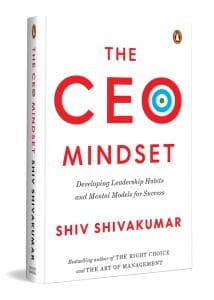If there is one question I am asked repeatedly in forums it is this: ‘My CEO is insecure. What are my options?’ It is amazing that employees seem to have a good sense of whether their CEOs are insecure or not. Obviously, they can figure them out better than most.
The CEO is insecure because of the Peter principle: he or she has been promoted to their level of incompetence.
How do you recognize if my CEO is insecure?
Watch their behaviour. Watch their words.
There are many symptoms of insecurity, and I am sure you will have your own list. From my experience, I have tabulated the following:
Here are ten questions/statements you must ask about your CEO; score them on a scale of 1 to 10. If the total score is above 60, you can be sure that your CEO is insecure.
- Is the CEO comfortable laying the blame on someone’s desk when things don’t work out? And in assigning blame, does he absolve himself of any role in the failure?
- The CEO rarely takes feedback, and even when they get it, they are defensive about it.
- The CEO is easily threatened. Everything is about himself or herself and he/she wants to be the face of the company or the unit all the time.
- The CEO is a micro-manager, wants to know every detail of every input and wants you to take their input seriously.
- The CEO has a big fear of failure and always looks for tangible evidence and comments that their idea has brought success. Their fear of risk manifests in them choosing safe options in every decision they make.
- The CEO does not invite you to all meetings. They are selective about who is invited, and they rotate people at meetings so that no one gets too comfortable.
- They think they have all the answers and are always giving you glib replies to your questions.
- They refuse to delegate anything. A sign of this is that the CEO is perennially busy with trivial inputs and decisions, and things get held up or slow down.
- The CEO constantly wants approval or reassurance and is looking for people to shower them with praise in every instance.
- They do not celebrate others’ success. They always want to be the prima donna.
What can one do with an insecure CEO?
At the outset, you can never stop a CEO from feeling insecure, and if you try and fix their insecurity, you will be wasting your time and energy. However, one can try the following:
- Ensure that you communicate well; that you take on the onus of communication. Whenever I worked with an insecure manager, I always ensured that I kept the person briefed all the time so that he/she was never surprised.
- Acknowledge her/his strengths and lean on them if it helps you solve something. Every leader at that level will have something positive about him/her, something she/he is good at.
- Give such CEOs credit or share credit with them where they have contributed.
- Seek clarity if you feel there is a misunderstanding over something. You can seek clarity from them, but they may or may not provide it; that’s their call.
- Always be transparent. Know your boundaries.
- Focus on producing high-quality work since the insecure CEO will go after you if your work standard is poor.
- Avoid any negative talk. I once deliberately told a good friend of my boss’s that the boss was the worst manager I had worked for, and I was sure it would get to the boss. It did, and the boss was cold to me for a month afterwards. But I wanted to send that message across as I was not going to be in the company a few months later.
- Whatever you do, please ensure that your reputation doesn’t suffer because of your insecure CEO.
- See how you can help insecure CEOs with their goals and time. I have offered my time to help insecure CEOs, and some did take it.
- To start with, establish regular check-in points, almost once a week, and then drop it to once a month when you are comfortable that the CEO is less insecure.
Also read: Economics must listen to human beings—not teach them to think like rational experts
When you work for an insecure CEO, you must watch out for yourself. No one else will help you.
One must be clear what the end game is.
If you believe that the insecure CEO or the insecure owner will be around for a long time, then you need to evaluate your options.
You could get transferred to another part of the business or country where you don’t need to deal with the CEO or owner.
You could raise the issue with the HR department if they are not compromised. Often, HR will not have the courage to tell the CEO or the owner the truth.
Seek an informal, open honest conversation with the insecure CEO if he/she is agreeable to it. You can try; it might not work.
Evaluate your options outside the company and develop a list of likely companies you might want to work for. In building this list, check for the company culture and the credentials of
the CEO. The worst thing to do is to leave one insecure CEO just to work for another!
I also feel that many CEOs experience imposter syndrome. I think they feel it in their bones that they are not up to the task assigned to them, so they must be aggressive to counterbalance their insecurity. I also think the imposter syndrome feeling is more real now as the world is changing quickly. CEOs do not feel adequate to deal with digital changes and new business models.
When a CEO experiences imposter syndrome, I have seen the following things unfurl in them:
- Inability to accept mistakes.
- Inability to accept any weakness. Everything is couched to project strength.
- Discomfort when subordinates are praised or get credit. They always insert their own name into the conversation when their subordinates are praised.
- They are a bit whimsical; they blow hot and cold and keep people close and far depending on their mood.
- They go silent when you pointedly ask them something.
I have also seen the other side—when a CEO is confident. Then:
- He/she admits openly to mistakes and to learning from mistakes.
- She/he listens carefully and is the last to speak in a meeting.
- They stand up for the behaviours expected of them.
- There is a lot more fun in the room when people are not walking on eggshells and some are happy to poke fun at the CEO too.
- There is challenge and counter-challenge without the aim of making the other look small.
- Junior people speak up in meetings and forums.
- The CEO gets asked many challenging questions in a town hall and customer visits or market visits.
- There is harmless ribbing in meetings.
 This excerpt from Shiv Shivakumar’s ‘The CEO Mindset’ has been published with permission from Penguin Random House India.
This excerpt from Shiv Shivakumar’s ‘The CEO Mindset’ has been published with permission from Penguin Random House India.






